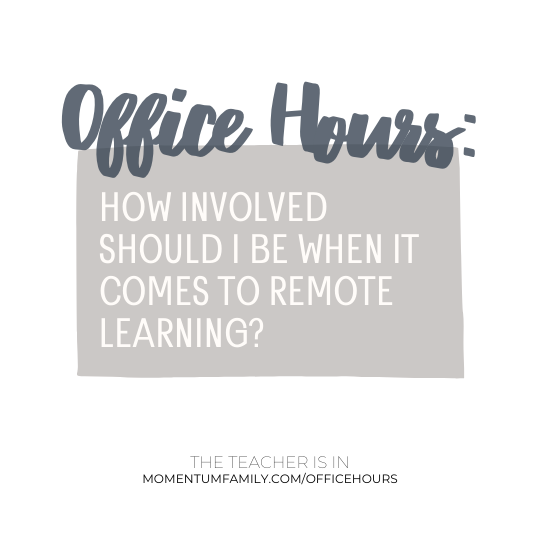How Much Should I Help with eLearning?

Mom’s Involvement in eLearning
Moms: If your child is participating in elearning, you know all too well that fine line you walk between offering too much help or giving them too much space + not knowing what’s going on. On one hand, you might be getting yelled at by your kids for hovering or distracting them. At the same time, you might feel completely out of the loop + have no idea what they’re supposed to be working on because you were trying to give them space.
However, it’s also entirely possible that your child spirals into a meltdown if you leave for 5 seconds just to go to the bathroom. It’s natural to want to reassure your child + be there for them, but at the same time, you might worry that they’re a little too reliant upon you. In fact, you might be frustrated by how much you have to help them day in and day out.
It’s so hard to know how to reach the middle ground. And I promise you, no matter which scenario you find yourself in, I want you to know that it’s okay. You care about your child + want what’s best for them, but the answers aren’t always straightforward as we’d like them to be. That’s what makes elearning so hard.
eLearning Help with a Balance
More important than knowing the right amount of involvement is having the awareness of why your child might be struggling in the first place. Let’s take a look at some of the problems elearning is causing for students. Then we will be able to best identify the best approach to meeting those needs so that you can achieve better balance with your degree of involvement.
Imagine sitting at work with your boss sitting next to you watching everything you’re doing. Or what if your husband followed you around the house checking your work as you go? It would drive you crazy!
The same goes for some of our kids. They can’t stand when you’re around checking in on them. Trust me, plenty of well-intentioned moms are uncertain that their children can be trusted or capable to work independently, so if you’re feeling this way, don’t worry.
Here’s the reality: in the classroom, your child’s teacher would not be sitting alongside them all day long. They can’t. And nor should you. In the same way you don’t want your boss or husband hovering, it wouldn’t be good for your child either.
One of the most important things your child’s teacher does in the classroom has nothing to do with the content your child is learning. Instead, it is to establish the structures that help your child’s development of the soft skills (i.e., grit, determination, collaboration, independence, etc.) they will need in order to be successful in their work beyond school. It takes decades to hone these skills + it starts in elementary school.
In light of the fact that your child + their teacher aren’t in the same room together during elearning, the responsibility of developing the structures + routines similar to a classroom falls to you.
Scenario A: Your child wants space
The extent to which you need to help this process is going to be child-specific:
The Confident Child
“I’ve Got This!”
This Might Be Your Child If They:
- self-start on assignments
- stay on task
- complete assignments on time
- advocate for help when they need it
- keep track of their belongings + classwork
- manage their schedule
- can navigate the technology
If This Is Your Child…
- Every teacher checks in with their students at points throughout the day, what varies is the frequency they do so with each student. If this is something you feel you as a mom want to build into the day, then do it! You can use the time to connect about how things are going, offer help + share successes.
- If your child is sensitive to your inquiries, avoid spontaneous or frequent check-ins.
- Consider establishing an agreed-upon time to touch base each day or AM/PM. When it’s anticipated + clear why you want to connect, your child is more likely to oblige + even benefit from the check-ins together.
A Reminder For Mom:
Occasional check-ins may be needed, but you may not have to check in much at all because they demonstrating that they are well on their way to developing the skills they need in order to be successful with learning at home.
The hardest thing for you may be exercising restraint when you want to check-in. Showing your child that they have earned your trust + you respect their independence is what they are looking for from you. Just as an expert teacher learns to gradually release support, so should you. It is counterintuitive, but absolutely key in helping your child’s continued development.

The Defensive Child:
“Don’t Help Me (Even though I need it)!”
This Might Be Your Child If They:
- struggle to start on tasks
- get off-task frequently
- struggle to complete assignments on time
- don’t ask for help when they should
- misplace their belongings + classwork often
- forget to follow their schedule
- can’t navigate the technology
Your Child Might Be Feeling:
- Defensive: They may be aware of the struggle they’re having, but don’t know how to admit it.
- Ashamed: They don’t like knowing that they’re having a difficult time + it’s showing.
- Defeated: They may be burned out from repeated failures to be successful + are frustrated beyond the point of recognition.
If This Is Your Child…
- Reach out to your child’s teacher for their insights. Working collaboratively to help one another is so important during this time.
- Discuss with the teacher which of the following may be the best area of focus to really focus on first:
- Task initiation
- On-Task Behavior
- Assignment Completion
- Self-Advocacy
- Organization of Supplies
- Following a Schedule
- Come to a consensus about a strategy to help with the behavior.
- Have honest conversations with your child about their habits. Listen more than talk.
- Increase your positive interactions with your child during your check-ins. Be sincere + supportive.
- Preserving your relationship with your child is more important than anything else.
- Emphasize your child’s efforts over their accomplishments. The goal is to shift their mindset to their process, not their achievement.
- It can get really easy to focus on everything going wrong. Since it can’t all change overnight, give yourself + your child the space you both need for the process to happen. I know it’s hard to wait, but be confident in the fact that your efforts are slowly, but surely, paying off.
A Reminder for Mom:
Much like a teacher, your emphasis might need to be on routines + habits before you stress over the actual learning. eLearning is intense enough as it is. And because you have been getting some push-back, you will want to start small. Instead of trying to do an overhaul that’s sure to make everyone crash + burn, pick small ways to start building your child’s confidence + sense of success.

Scenario B: Your child won’t do anything without you or prefers your help
Some of our kids have grown dependent on their moms to be their cheerleader, tutor, + secretary in this time of elearning. I promise you, from the bottom of my heart, as much as they love you, they are capable of doing so much on their own. You need to stick to that knowledge + use it to your advantage in order to course-correct on behalf of your child.
The Disengaged Child
“Huh? What am I supposed to be doing?”
This Might Be Your Child If They:
- don’t seem particularly motivated
- give their attention to anything other than school
- need you to prompt them every step of the way
- aren’t motivated to follow their schedule, even though they are capable
- don’t complete their work, even though they could
- say “I don’t know” in response to a lot of your questions
Your Child Might Be Feeling:
- Lost: eLearning is overwhelming!
- Tired: eLearning requires a lot of independence. It is possible that your child has not built up the stamina needed in order to keep up.
- Detached: We know that this is a time of social isolation. This is taking a toll on so many kids + can have a profound impact on their motivation.
If This is Your Child…
- Observe. Sit back + see what might be the root cause of the problem. It’s possible your child isn’t even clear on the crux of their disengagement.
- Reach out to your child’s teacher for their insights. Working collaboratively to support one another is so important during this time.
- Do what you can to help your child simplify their day by putting organization + time management supports into their day. Having bins for supplies + alarms set as reminders can help your child feel more centered + equipped to take on all of the components that go into staying on top of everything.
- Inquire with the teacher about ways to chunk assignments into more digestible pieces. If your child has confidence in what is being asked of them, they are more likely to feel motivated to attempt it.
- Make sure that you build-in time to connect meaningfully with your child throughout the day. Giving 5 minutes of your undivided attention throughout the day (think: before school, during device breaks, at lunch, or after school) can have a huge impact. Remember to do anything other than talk about school. Go for a walk, through the football around, play cards, listen to music. That connection could make all of the difference for your child.
A Reminder for Mom:
It can be really tempting to talk to your child about ‘what’s wrong’ or why they’re ‘acting this way’, but it will be counterproductive. During elearning, put your efforts into subtle, positive experiences + structures that will help your child’s social-emotional needs at this difficult time. Don’t hesitate to reach out to the school social worker or counselor, either. Many schools have put together parent resources in order to support this very need!

The Reliant Child
“Mommy, I can’t do this by myself.”
This Might Be Your Child If They:
- frequently ask for or demand your help
- are upset if you leave the room
- want you to ask the teacher questions on their behalf
- say they don’t know how to do their work
- insist the work is too hard
Your Child Might Be Feeling:
- Co-Dependent: You have been helping them from the beginning, the idea of you leaving their side is scary or uncomfortable.
- Unassertive: They may be very cautious to make a move for fear of making the wrong choice or doing something incorrectly.
- Self-Critical: They perceive they ‘can’t do anything right’ + having mom by their side gives them immediate feedback on how they’re doing.
- Shy: They may be introverted + the risk of standing out seems too high that they’d rather mom be their voice.
If This Is Your Child:
- Reach out to the teacher for a collaborative conversation about any academic concerns. There is a difference between ‘can’t do’ + ‘won’t do’ but many kids blur the two beyond distinction. If you are concerned the content is stretch for your child in the learning setting, the teacher can differentiate the assignments + offer supplemental support.
- Look for subject areas or times of day when you see that your child is confident. Gradually release responsibility to your child during this time period first. You might start by working alongside your child on your own tasks. Once your child. is comfortable with this, you might step away for a few minutes of time. Eventually, you should be able to do a quick check-in at the start of a task before leaving to work in another space.
- Practice affirmations with your child. Demonstrate this by posting affirmations for yourself around the house. Say your affirmations aloud. Invite your child to join you. This is a huge confidence builder.
- Give your child a short list of 2-3 sentence or question stems to use during class time to build their skills in initiating their participation. Some examples are:
- I have a question.
- Can you help me with _____?
- I think _____.
- I have a connection to _____.
- Encourage your child to use the chat feature with their teacher if they are not yet comfortable using their voice. Many younger kids use the dictation feature with great success.
Reminder for Mom:
Your child may be highly sensitive + reliant upon you at this point in time. This is often very difficult for the child + mom alike. If at all possible, reach out to a family member, close friend, or babysitter who might be able to help a couple of hours a week or even with homework. When you recruit people in your support network during elearning, not only will your child benefit, but you will as well!

No Matter What…
Here’s what it really boils down to. There are really two key components to a teacher’s time with the kids. There is the instruction component, this is the actual teaching, the work students are doing, etc.
Then there is the classroom management piece. These are the structures + routines the teacher creates to set expectations + build accountability to ensure that your child is not only on-task in the moment but also developing all of the important life skills that will take them so much further than the content they are learning.
Your role at home is mostly to support the “classroom” management.
The key for you is to take small steps to build in accountability, support gradual independence + foster a mutually-trusting relationship with your child.
Once you + your child have worked to clarify expectations + define your roles it’s much easier to achieve the sense of balance you’ve been longing for.

More Office Hours Posts:
eLearning Schedule Hacks From a School Teacher
Virtual Learning Organization To Save Your Sanity
Follow Me on Instagram
Leave a Reply
Are we friends yet? Follow me @MomLifeHandbook on your favorite social channel.
© MOM LIFE HANDBOOK 2022 | design by tonic | photos by KRISTIN WEINBERG AND ERIN CHRISTOPOULOS | PRIVACY, TermS + CONDITIONS
Mom life is complex,
but it doesn't have to be complicated.
LET'S SIMPLIFY THINGS.










[…] How Much Should I Help with eLearning? […]
[…] How Much Should I Help with eLearning? […]
[…] How Much Should I Help with eLearning? […]